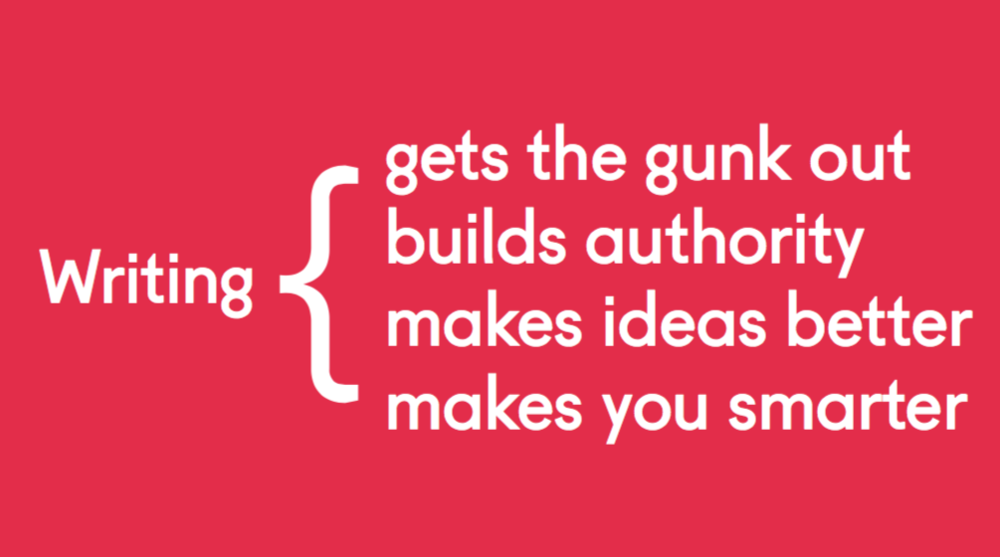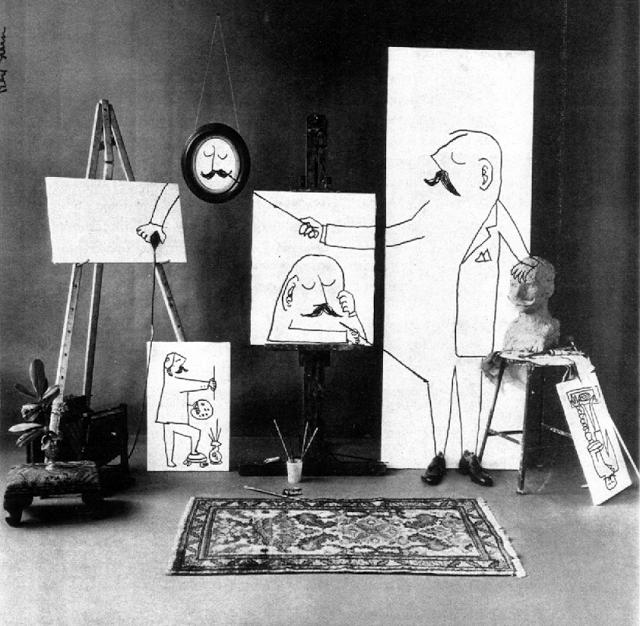I’m going to start with a thought experiment.
Is time travel possible?
Professor Brian Cox says you can travel forwards in time (so long as you’re ok with staying there) but I believe you can travel back in time too.
And I’m going to prove it.
Ready?
Here’s my time travel device.
Three, two, one…
I wrote this sentence at 5.52am on Saturday 30th May 2015 in London, but at this precise moment my words are currently inside your head.
Ok, so we can’t physically travel back in time, but the amazing thing about writing is that it makes us telepathic.
If you can formulate an idea into words, other people at different moments in space and time can read theme, and hear your idea inside their head.
In a nutshell, writing makes you superhuman. More so because you can make anything by writing.
Think of Plato, Da Vinci, Shakespeare, Darwin.
We know about history’s great thinkers because they took the trouble to write things down.
So if writing is so great, why don’t we do it more often?
(When I say “writing”, by the way, I don’t mean tweets, status updates, project proposals, pitches, invoices, emails, thank you notes or letters of complaint to your neighbours. They don’t count, because they’re written for other people, not you).
Maybe you have a blog where the latest post is an apology for not blogging…
Maybe the latest ‘news’ article on your company website is more than 6 months old…
Or maybe there’s an idea stuck inside your head, and you’re scared to give it a voice…
Why is this?
Why is writing so damn hard?

Well, I think that writing is like flossing.
Even though we know the health benefits, we make excuses not to do it.
- Don’t know how to floss
- Don’t have time to floss
- When you do floss: Ow! It hurts!!!
The excuses we make not to write are exactly the same:
- Don’t know how to write
- Don’t have time to write
- And when you do write: Ow! It hurts!!!
On the subject of pain, you’ll probably know this Ernest Hemingway quote:
“There is nothing to writing. All you do, is sit down at a typewriter, and bleed.”
I disagree. (And not just because no-one uses typewriters any more).
Writing doesn’t have to hurt, if you do it right.
My story: an accidental writer
I became a writer by accident.
A few years ago, I went through one of those “What the hell am I doing with my life” patches. I was depressed, and confused about my career as a graphic designer.
Because most of my work is digital, it’s only online for a few years. I felt invisible, and wanted to leave a mark on the world, other than just pixels.
Luckily around this time, I watched a documentary about the cycling photographer Bill Cunningham, and was inspired to start taking photos of people on their bikes around London.
I wrote a sentence or two about each person I photographed, which became short interviews, which became longer articles… and before I knew it I had a popular blog on my hands.
People I hadn’t met invited me into their homes. I went on all-expenses-paid blogging trips (that’s me pushing the bike in the photo), I was interviewed on Belgian TV, made the front of Hacker News and page 20 of The Times, and turned down a request to talk about track cycling on BBC radio during the London Olympics because I wouldn’t have know what the hell to say.
What’s funny about all this is that I didn’t cycle for the entire ten years that I lived in Glasgow. But after a few years back on a bike, and less than a year of writing about cycling, I was suddenly perceived as an “expert”.
Outside of this blogging success though, I was still struggling with my professional life as a graphic designer.
So I started a personal blog, and wrote an angry articled about How to stop being a graphic designer.
This was the first time I’d been honest about my feelings online, and the response took me by surprise. (And I still get emails about that article, even though my position has shifted, and I’m now grateful that I can make a good living from design).
As I wrote more about the profession, I became a kind of agony aunt for graphic designers. I realised that not many people were writing honestly about the design profession, and that by talking about my own problems, I could help others.
Since then I’ve written about my experience of depression, about some of the stupid things I did when I was a student, and about quitting my job to go travelling and become a freelancer.
It feels like meaningful work, in a way that design never has for me. I get emails from people thanking me for articles almost every week, whilst I can probably count on one hand the number of emails I’ve ever received thanking me for my design work.
Why you should write (even if no-one is reading yet)
Writing doesn’t just help you, it can also help anyone who reads what you’ve written. And I promise you that you’ll have more to say than you think, even if it’s tricky to extract your thoughts.
Think of an artist, who’s just started painting.
He wouldn’t worry about organising an exhibition until he had some great work to show.
It’s the same with writing.
Don’t worry about how you’re going to find readers, which blogging platform to use, or which text editor to use.
Your chief concern should be listening to your self. (Not just “yourself”, but your inner self).
And then writing as often as possible; carving out time in your week to sit down without distractions and write something.

(Just some of the) reasons you should write
Reason 1: Writing gets the gunk out
Just like flossing removes gunk from between your teeth, writing removes gunk from between your brain cells. So if something is waking you up in the middle of the night, try writing it down.
By writing a personal diary or journal, you can release pent up emotions like sadness, anger, or bitterness. You can write happy things down too — I try to write down one thing that I’m grateful each day, for example.
Reason 2: Writing builds authority
Writing a blog about cycling made people think I was an expert. Think about the people you admire in your field: you probably know of their work because they write about it. Writing makes you an expert.
Writing unlocks doors too. Instead of asking someone you admire if you can “pick your brains about something over coffee”, you can ask to interview them for your blog. Much better.
Reason 3: Writing makes ideas better By writing down an idea so that someone else can understand it, it becomes clearer to yourself.
If you can’t explain it to a six year old, you don’t understand it yourself.” ― Albert Einstein
The act of writing forces you to get to the core of an idea. If your thinking is muddy, your writing will be too. But if you’ve found a way to write it down clearly, you can be sure that you’re onto something good.
Banishing the excuses
So what about those pesky excuses for not writing I mentioned earlier?
Excuse 1: Don’t know how to write
Here’s the writing paradox: You won’t find out what you have to write about until you start.
If you do get stuck, think of a question that you are often asked in your professional or private life, and write an answer as if you are talking to one person. When you’re done, ask if what you’ve written is so useful that someone reading it would likely email it to a friend.
By teaching what you know, you can turn the learning process into a feedback loop, an echo chamber for your ideas.
Learn. Teach. Learn. Teach. Learn. Teach.
It’s an infinite loop.
Learn about things by reading. Then teach them by writing.
Rinse and repeat.
Excuse 2: Don’t have time.
Carve out a regular slot in your schedule for writing. I like to write first thing in the morning because there are less distractions and I can boast about it on social media. Figure out your best time to write, and make it sacred.
You don’t have to go crazy either. I only publish one blog post a week, but I’ll do it come rain or shine (most of the time) because I have a mailing list who I’ve promised a weekly email.
If you don’t fancy putting your writing online, that’s fine. Just keeping a daily journal, or making lists of ideas, or writing down your dreams will give you huge insights into your inner thoughts. Whatever you do, aim to do it little and often, and you’ll soon reap the benefits. (Creativity is a habit, not a feeling).
Remember that writing is a muscle. But you don’t have to write every day. Even a weekly or twice weekly writing slot will help. (I send an email newsletter every Sunday—or at least, I try to—because it forces me to write something useful once a week).
Excuse 3: Ow! It hurts!!!
Flossing is physically painful at the start, but is writing?
(Hint: if it is, you might want to check your posture).
We get frightened about revealing our thoughts because we don’t want to be judged. That fear of putting pen to paper, or of hitting publish, can be crippling. I know because I feel it all the time.
But what I’ve realised is this:
To be magnetic, you must be willing to repel as many people as you attract.
And it goes even further than that.
It’s good to have haters, because it means you have lovers too.
Forget about SEO
SEO is writing for robots. Other than making sure your blog follows some basic rules of HTML, you don’t need to worry about it.
Which is why I’ve coined a new term: HEO, or Human Emotion Optimisation.

Some simple ideas to help you improve your HEO:
Be honest. Being honest is the easiest way to be interesting, because so few people do it.
Don’t just write blog posts, tell stories. Writers like James Altucher have a warts and all stream of consciousness on their blog. And there are startups like Buffer who talk about their content strategy, and even their salaries on their business blog.
Share your company’s thought processes and strategies like a chef would a recipe, instead of treating them like a secret sauce.</p>
How to make your writing better
To write better, read more. Don’t read what everyone else is reading. Ask interesting people you meet to recommend you books. Raid your parents’ collection. Pick something at random from the bibliography of your favourite book.
Two of my favourite books about writing are Stephen King’s On Writing (which is mostly about writing fiction, but still an essential read) and Writing That Works, How to Communicate Effectively in Business by Kenneth Roman and Joel Raphaelson (which has possibly the worst-designed cover I’ve ever seen. Don’t let this put you off!)
Once you’ve written, you need to edit. Don’t try to edit whilst writing though — make it a distinctly separate part of your process.
Edit, ruthlessly.
- Remove any unnecessary words.
- Avoid cliches like the plague (oops)
- Use punchy words instead of exclamation marks!!!
And finally…
Write like you talk.
One doesn’t use pontificous language and extraneous syllables when one is communicating using the human tongue in person, so why do the same when writing? If you have trouble writing naturally, try recording yourself talking and transcribe the results afterwards.
“If it sounds like writing, I rewrite it”.
— Elmore Leonard
Writing changes everything
Of all the life changes I've written about over the past few years, the most transformative has been the writing itself.
And it was only when I came to write this article (which was originally a talk) that I realised this.
Of course I’m not the first person to recognise this…
I’d argue that the cognitive shift in going from an audience of zero (talking to yourself) to an audience of 10 (a few friends or random strangers checking out your online post) is so big that it’s actually huger than going from 10 people to a million.
— Clive Thompson (Writer for The New York Time and Wired magazine).
Writing creates an amazing feedback loop which enhances everything you do.
So I’m going to wrap things up with this drawing by the great Saul Steinberg, who described himself a writer who draws.

For me, his image represents the multiplying writing can bring to your life, if you’re willing to push past the excuses.
If you want people to hear about your business, you should write.
If you care about sharing and improving ideas, you should write.
And above all…
If you want to find your voice, and to understand yourself, you should write.